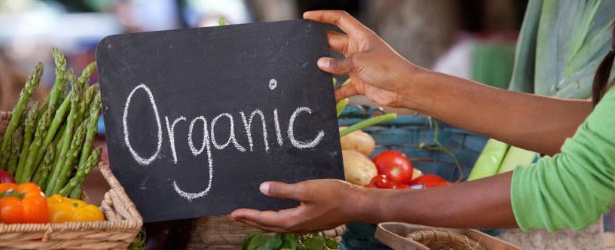Record growth of organic food consumption in the U.S. and India

There has been record growth in sales of organic, non-GMO food in some of the world's largest produce markets, a good thing for consumers and advocates of clean, wholesome, non-bioengineered commodities.
In the United States, the value of the organic foods market in 2013 exceeded $35 billion for the very first time, an increase of nearly 12 percent from the previous year, according to Eileen Bentley, small business and prepared foods manager at Bord Bia, the Irish Food Board.
The U.S. economy, as a whole, has been growing, on average, at between 1 and 2 percent for months, which is dismal.
As reported by AgriLand, an Ireland-based agricultural news site, Bentley outlined in a recent Bord Bia Food Alert that data compiled by the U.S. Organic Trade Association (OTA) found that the 2013 figures represent the fastest growth in purchase and consumption of organic food in five years.
The growth rate has led the OTA to boost its forecast figures; the organization is calling for a similar growth rate (increase) in both 2014 and 2015, in what is more good news for the organic industry. The survey by the OTA found that food represents 92 percent of organic sales in the United States, with organic food accounting for over 4 percent of the more than $900 billion in annual food sales in that market.
U.S. market is expanding rapidly
As reported by Bord Bia:
Fruit and vegetables accounts for 15% of total organic food sales, and the organic snack food sector grew 15% in 2013 to $1.7bn. The organic packaged and prepared food sector grew by 10% to $4.8bn. Only Dairy and Organic Beverages experienced single digit growth in 2013.
Bentley also said that, in Ireland, the latest figures report a return to growth of the organic retail market this year, a market that is worth $130 million and has grown just over 2 percent year on year.
Meanwhile, another fast-emerging organic food market is India. According to a press release by TechSci Research, a Canadian global research firm:
According to "India Organic Food Market Forecast & Opportunities, 2019", the organic food market revenues in India are expected to grow at a CAGR [combined annual growth rate] of around 25% during 2014-19.
Reasons attributed to the rapid growth of the Indian organic food market include a rising health-consciousness among Indian consumers, rising disposable income due to globalization of markets, and an expanding middle class in the nation of more than 1 billion people.
Nowhere to go but up, in terms of growth
In addition, the group noted that India is "emerging as a potential destination for organic farming due to growing number [sic] of certified farmlands, as well as diverse climatic conditions and soil types in different states across the country."
Also, the availability of organic food products is rising gradually because of a steady increase in the number of retail and distribution stores. Various major retailers, including Sresta Natural and Morarka Organic Foods are enlarging their distribution networks in Tier I and II cities through associations with leading retail chains as well as the establishment of exclusive organic food stores and outlets.
Still, there are hurdles to further growth and expansion.
"The market for organic food products in India is highly unorganized. With rising cases of food adulteration across the country, the demand for organic food products has gone up significantly. Growing number of upper middle class people are becoming increasingly concerned about the food quality, and are willing to pay a premium of 10-20% for organic food products. As a result, this segment of the society is currently emerging as a major demand driver for the organic food products market in India," said Mr. Karan Chechi, Research Director with TechSci Research.
The major organic-food-producing states in India include Maharashtra, Andhra Pradesh, Karnataka and Uttar Pradesh, the research firm noted.
Sources:
http://www.agriland.ie
http://www.bbc.com
http://www.bordbia.ie
http://www.pr.com
Republished with permission from NaturalNews
Written by J.D. Heyes

Wow! You mean people do not want female hormones, nicotine, pesticides, fertilizer, reprocessed industrial waste, viral DNA and random animal genes in their food?
What? Are they trying to life a healthy or something?
Interesting to see how this pans out with a rapidly falling water table in India.
plus food not sprayed with round-up.
Soil it was grown in probly lacks the minerals
Grow your own garden, and WOOD ASH to your soil.